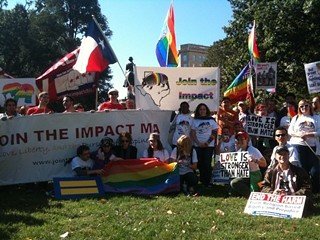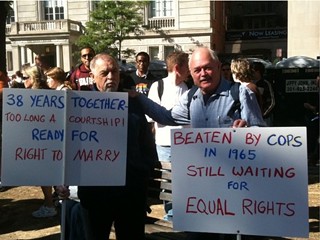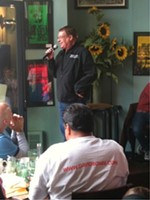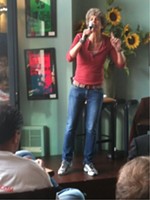The National Equality March: A Recap
Tensions abound after this weekend's National Equality March. The HRC and national reps on one side, the grassroots on the other.
By Frank J. Rivera, 11:19AM, Tue. Oct. 13, 2009
OPEN IMAGE GALLERY

For decades, Thornton Wilder’s Our Town has been the most produced play in the country. The play spoke of the commonality across small town America and the shared experiences of average Americana. From small towns and large, an estimated 150,000 to 200,000 supporters of GLBT rights arrived this past weekend, in our nation’s capitol.
Their reasons for marching were varied: repeal of DoMA (Defense of Marriage Act) or Don’t Ask Don’t Tell, passing of the Matthew Shepard Hate Crimes Prevention Act, marriage equality, transgender visibility and rights, adoption by gay parents, and many many others. The National Equality March did not wish to engage on a specific gay rights target, believing full equality needs to be the eventual goal.
The night before, the Human Rights Campaign hosted Barack Obama, only the second sitting president to address a gay rights organization. His speech, while stirring and emphasizing previous campaign promises of assistance, was met with tepid response by a large percentage of the gay community. As one observer noted, the speech was “full of sound and fury, signifying nothing.” No dates were provided and a desire for “patience” was emphasized. The next day, marchers and speakers were not having it.
This reaction — both to the HRC and Obama’s speech — is symptomatic of the weekend itself.
Last week, Rep. Barney Frank (D-MA) told the Associated Press that the National Equality March was going to be a “waste of time” and “the only thing they’re going to be putting pressure on is the grass.” He recommended the protesters go home and model themselves after successful lobbies like the NRA and the AARP. The HRC itself seemed lampooned into giving last-minute support for the NEM.
The animosity was two-fold. Co-director of the NEM Cleve Jones let his annoyance towards the HRC (and especially President Joe Solmonese’s comments regarding waiting till 2017 to press for marriage equality) be well known. Speakers at the NEM repeatedly mentioned creating tightly knit grassroots organizations so that it was no longer necessary to send money to some “far off, removed organization.”
There is a schism between national and local arms of the gay movement that — for any united effort to be maintained — need to be resolved.
Last night, Zach Scott actors read The Laramie Project: 10 Years Later, an epilogue to the massively successful production recalling the reaction expressed by citizens of Laramie, WY, concerning the murder of gay undergraduate Matthew Shepard. Over 100 theatres across the nation mounted simultaneous productions of Moises Kaufman and the Tectonic Theatre Co.’s work, tossing coverage and questions back to the New York Production at the Lincoln Center.
Emblematic of a simple, yet effective national campaign, The Laramie Project has supplanted Our Town as the most produced play in the United States. Perhaps because it has never really been a production about gay rights, but how Everytown, USA, reacts to a tragedy and media attention, it has become a modern day Our Town.
Judy Shepard spoke at the Lincoln’s Center’s production, a day after speaking at the NEM and for National Coming Out Day. Her words were similar, her pain still fresh after a decade. But she was adamant to point out that change can be achieved. After a decade of work, the Matthew Shepard Hate Crimes Prevention Act has passed through the House and is on its way to the Senate, where a President who already affirmed his intention to sign it into law sits behind a desk. As Judy Shepard said, “It’s a done deal.”
Truth enough for the time being. Gay rights groups are achieving one of their demands. Others wait, but how they are approached by those fighting for and against them remains to be seen.
A note to readers: Bold and uncensored, The Austin Chronicle has been Austin’s independent news source for over 40 years, expressing the community’s political and environmental concerns and supporting its active cultural scene. Now more than ever, we need your support to continue supplying Austin with independent, free press. If real news is important to you, please consider making a donation of $5, $10 or whatever you can afford, to help keep our journalism on stands.
Frank J. Rivera, Oct. 13, 2009
Frank J. Rivera, Oct. 13, 2009
Mary Tuma, Oct. 21, 2016
The Laramie Project, National Equality March, Human Rights Campaign, Judy Shepard, Laramie Project, Cleve Jones












